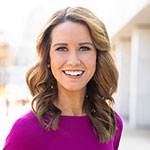Julia Benbrook
Julia Benbrook (MSJ21)
D.C. Bureau Reporter for Spectrum News

Tell us about your career path. How did you get where you are today?
My passion for journalism goes back to the eighth grade when I wrote an essay for a class titled “Why America’s Veterans Should be Honored.” It outlined the service of my grandfather who served in the Navy during World War II. He was captured by the Japanese and held captive for three and a half years. My teacher submitted my essay to the VFW Patriot’s Pen writing contest and mine was chosen out of 110,000 other applicants as the national winner. I was given a free trip to Washington D.C. to tour the area and present my essay to the national officers of the Veterans of Foreign Wars. Even as a middle school student, I understood that the four hundred words I wrote touched a lot of people in that group. The impact of my grandfather's story inspired me to become a journalist. I went on to receive my bachelor’s degree in journalism from Oklahoma State University and took my first broadcast job at the CBS affiliate in Tulsa, Oklahoma covering a wide variety of topics. I knew that my passion was in political journalism and decided to join Medill’s Politics, Policy and Foreign Affairs program in Washington D.C. which felt like a full circle moment because it brought me back to the very place that inspired me to pursue this career path.
What are your main responsibilities in your current role?
As a D.C. Bureau Reporter for Spectrum News, I cover the White House and Congress with an emphasis on the Kentucky delegation. I report on how national policies enacted on Capitol Hill impact Kentuckians. The focus on a specific state allows me to get to know the delegation, the issues, and the voters on a deeper level.
How has your Medill training helped you in your career?
The Medill Washington bureau operates like a newsroom which was the key reason I wanted to be a part of the program. I was able to report from Capitol Hill for local stations during school which helped strengthen my skills and my resume at the same time. My work during the program was published by USA Today, The Hill, Inside Climate News and various local broadcast stations. The Washington bureau team which, at the time, included professors Ellen Shearer, Matthew Orr and Ivan Meyers invested in each one of us and worked to make sure the curriculum was individualized enough to help us reach the next career goal. For example, I came into the program with experience in local news so they helped me build on the things I had already experienced.
How has the Northwestern Medill network helped you advance in your career?
The people in the Medill community are what really make it stand out. I still stay in touch with the mentors I met during my time in the program. I can honestly say that I have never met a Medill alum who wasn’t willing to take out time out of their busy schedule to pass on some advice. This creates a pattern and inspires me to pass on the knowledge I have as well.
How can your industry be more inclusive and representative of society?
As journalists it’s our job to ask good questions, and this is one that each of us should be asking ourselves regularly. I am forever grateful for the middle school teacher who sparked my interest in writing early on, but not all students all students are lucky enough to have those types of opportunities presented to them. I think that creating more exploratory opportunities for middle school and high school students across the country would be one effective way to reach diverse voices and create interest in the industry early on.
How have your identities influenced the way you navigate your professional career?
I grew up in a small town in northwest Oklahoma. The town is over an hour drive from the nearest Starbucks which is sometimes difficult for people in big cities to comprehend. It’s an area known for its hospitality and hard-working people who often have different concerns than we see on the coasts where large media organizations are typically headquartered. I try to keep this perspective in mind with every story I write.
What advice do you have for someone considering Medill?
Go for it! Choosing to pursue a degree at Medill was one of the best decisions I’ve ever made. The people, the access, and the experiences that their programs offer are in a league of their own. I’m so proud to be a part of the Medill family forever. Go Cats!

